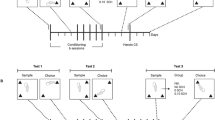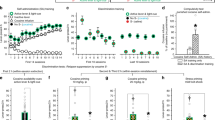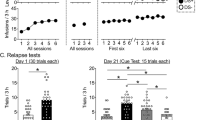Abstract
THERE is considerable evidence to indicate that learning is important in narcotic dependence1. However, there has been little animal research into the mechanism of the interaction between environmental stimuli and drug action which maintains dependence. In morphine-dependent rats2 and monkeys3 conditional stimuli previously associated with withdrawal can elicit physiological disturbances characteristic of narcotic withdrawal. Also, during withdrawal the conditional stimuli previously associated with morphine substitution can elicit blockade of morphine withdrawal4. In an experiment by Roffman et al.4, after a number of pairings with morphine injections, a neutral stimulus (bell) elicited a blockade of withdrawal hypothermia, a task normally accomplished by morphine itself. It was then suggested that there is an overlap between the brain mechanisms sensitive to morphine action and those affected by conditional stimuli5. Therefore, repeated pairing of hyperthermic effects of morphine with the stimulus-induced neural activity results in the conditioning of the former to the latter. We reasoned that if the brain activity due to a conditional stimulus evokes activity of the morphine receptors, a morphine antagonist should reverse the effectiveness of that stimulus in mimicking the morphine action. To obtain evidence in favour of this hypothesis we used naloxone, a specific antagonist of morphine action6.
This is a preview of subscription content, access via your institution
Access options
Subscribe to this journal
Receive 51 print issues and online access
$199.00 per year
only $3.90 per issue
Buy this article
- Purchase on Springer Link
- Instant access to full article PDF
Prices may be subject to local taxes which are calculated during checkout
Similar content being viewed by others
References
Wikler, A., Behav. Sci., 16, 92 (1971).
Wikler, A., and Pescor, F., Psychopharmacologia, 10, 235 (1963).
Goldberg, S., and Schuster, C., J. exp. anal. Behav., 10, 235 (1967).
Roffman, M., Reddy, C., and Lal, H., Drug Addiction, 1 (edit. by Singh, J., Miller, L., and Lal, H.), 223 (Future Publishing, New York, 1972).
Roffman, M., Reddy, C., and Lal, H., Psychopharmacologia, 29, 197 (1973).
Martin, W., Pharmacol. Rev., 19, 463 (1967).
Martin, W., and Sloan, J., Pharmacopsychiat. Neuro-psycho-pharmak., 1, 260 (1968).
Bykov, K., trans. by Gantt, W., The Cerebral Cortex and the Internal Organs (Chemical Publishing Co., 1957).
Collins, K., and Tatum, A., Am. J. Physiol., 74, 14 (1925).
Kleitman, N., and Crisler, G., Am. J. Physiol., 79, 571 (1927).
Wikler, A., Fraser, H., and Isbell, H., J. Pharmac. exp. Ther., 109, 92 (1953).
Wikler, A., and Carter, R., J. Pharmac. exp. Ther., 109, 92 (1953).
Cheney, D., Judson, B., and Goldstein, A., J. Pharmac. exp. Ther., 182, 189 (1972).
Mayer, D., Akil, H., and Liebeskind, J., Fed. Proc., 32, 693 (1973).
Author information
Authors and Affiliations
Rights and permissions
About this article
Cite this article
DRAWBAUGH, R., LAL, H. Reversal by Narcotic Antagonist of a Narcotic Action elicited by a Conditional Stimulus. Nature 247, 65–67 (1974). https://doi.org/10.1038/247065a0
Received:
Issue Date:
DOI: https://doi.org/10.1038/247065a0
This article is cited by
-
Naloxone enhances the expression of morphine-induced conditioned place preference
Psychopharmacology (1990)
-
Differential mechanisms in the acquisition and expression of heroin-induced place preference
Psychopharmacology (1989)
-
Behavioral and physiological detection of classically-conditioned blood pressure reduction
Psychopharmacology (1988)
-
Temporal and environmental cues in conditioned hypothermia and hyperthermia associated with morphine
Psychopharmacology (1981)
-
A conditioned response model of the placebo effect
Biofeedback and Self-Regulation (1980)
Comments
By submitting a comment you agree to abide by our Terms and Community Guidelines. If you find something abusive or that does not comply with our terms or guidelines please flag it as inappropriate.



